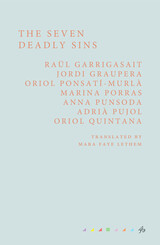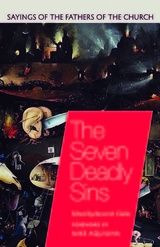
The Seven Deadly Sins is an ambitious project bringing together seven of the most exciting, vibrant voices in Catalan literature to write essays on what are perhaps the most enigmatic—and least understood—aspects of religion and morality. Drawing from many different sources, the essayists tell each sin’s story and origin in their own unique way to produce a collection that is frequently hilarious, and always entertaining and informative. In Mara Faye Lethem’s stunning translation, these are essays that can be enjoyed as part of a whole or individually.
Raül Garrigasait, Jordi Graupera, Oriol Ponsatí-Murlà, Marina Porras, Anna Punsoda, Adrià Pujol, and Oriol Quintana are some of the most promising new writers and intellectuals working in Catalonia today. Coming from various backgrounds, these award-winning writers encapsulate the dynamic social and cultural movement that is the current literature scene in Catalonia.

There is no society without right and wrong. There is no society without sin. But every culture has its own favorite list of trespasses. Perhaps the most influential of these was drawn up by the Church in late antiquity: the Seven Deadly Sins. Pride, sloth, gluttony, envy, anger, lust, and greed are not forbidden acts but the passions that lead us into temptation. Aviad Kleinberg, one of the most prominent public intellectuals in Israel, examines the arts of sinning and of finger pointing. What is wrong with a little sloth? Where would haute cuisine be without gluttony? Where would we all be without our parents’ lust? Has anger really gone out of style in the West? Can consumer culture survive without envy and greed? And with all humility, why shouldn’t we be proud?
With intellectual insight and deadpan humor, Kleinberg deftly guides the reader through Jewish, Christian, and Greco-Roman thoughts on sin. Each chapter weaves the past into the present and examines unchanging human passions and the deep cultural shifts in the way we make sense of them. Seven Deadly Sins is a compassionate, original, and witty look at the stuff that makes us human.

Sacred Scripture did not neatly list the seven deadly sins, so where did this tradition come from? Unsurprisingly, it can be traced back to the Church Fathers. But were there eight or seven? In a sense, the answer is “both.” The tradition of the capital sins has a rich development in the patristic era, not only in the presentation of the list of vices but in the preaching and teaching of the early shepherds of the Church. So how do the capital sins spawn other vices in the soul? How does one cultivate the virtues that heal the soul from those vices? How are gluttony and lust related? Is sadness really a vice? How is vainglory different from pride? What role does almsgiving have in soothing the passion of anger? The Fathers of the Church answer these questions and more in this volume.
The capital vices are the gateway drugs to countless sins. The path of the book descends through the vices, culminating with their queen ruler, pride. The words of the Fathers will assist the reader in being more realistic about the attacks upon the soul. The text should also be edifying and medicinal. Since each chapter begins with vice and ends with virtue, one’s path through the chapters represents a sort of ascent out of vice and into the freedom of the virtues. The text gives special attention throughout to the thought of Augustine of Hippo, Evagrius of Pontus, John Cassian, Gregory the Great, and Maximus the Confessor.
READERS
Browse our collection.
PUBLISHERS
See BiblioVault's publisher services.
STUDENT SERVICES
Files for college accessibility offices.
UChicago Accessibility Resources
home | accessibility | search | about | contact us
BiblioVault ® 2001 - 2024
The University of Chicago Press









